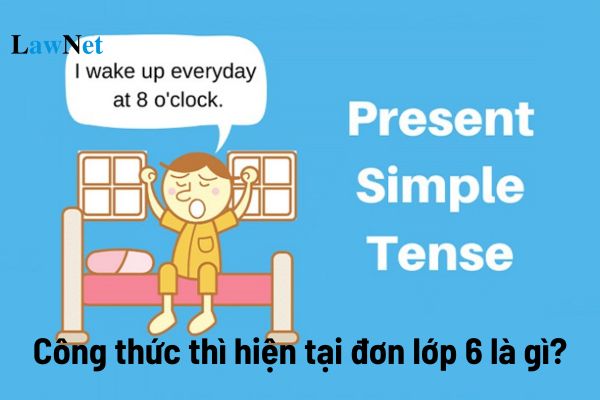Vietnam: What is the simple present tense formula for 6th-grade students? What are the disciplinary measures against 6th-grade students?
What is the simple present tense formula for 6th-grade students in Vietnam?
Simple Present Tense
The Simple Present Tense is used to describe actions, events that occur frequently, repeatedly, universal truths, facts, or fixed schedules and timetables.
|
What is the simple present tense formula for 6th-grade students in Vietnam? Indicators of the Simple Present Tense: |
*Note: The information about the simple present tense formula for 6th-grade students is for reference only./.

What is the simple present tense formula for 6th-grade students in Vietnam? What are the disciplinary measures against 6th-grade students? (Image from the Internet)
What are the disciplinary measures against 6th-grade students in Vietnam?
Under Article 38 of the lower secondary school, upper secondary school and multi-level school charter issued together with Circular 32/2020/TT-BGDDT, 6th-grade students making a mistake during the learning and training process shall be corrected or disciplined in the following measures:
- Give the student a reminder, directly support them in correcting their mistake.
- Reprimand the student, inform the student’s parent(s) to have the parent(s) cooperate in supporting the student in correcting their mistake.
- Suspend the student’s study at school for a definite period and take other correcting measures according to regulations from the Ministry of Education and Training.
Can 6th-grade students oppressed by teachers in Vietnam make complaints to the school?
Under Clause 2, Article 35 of the lower secondary school, upper secondary school and multi-level school charter issued together with Circular 32/2020/TT-BGDDT:
Rights of students
1. Receive comprehensive education with fairness, be provided with time, facilities, hygiene and safety to learn in class and self-learn at home, be informed of their education and training, and be able to use learning, cultural and sport equipment of their schools as per the law.
2. Receive respect, protection and fair and democratic treatment, complain to their schools and education authorities about decisions concerning themselves; transfer school with legitimate reason as per existing regulations; enter school before the compulsory starting age, skip a grade and study at an age higher than the compulsory attendance age according to regulations in Article 33 of this charter.
3. Participate in activities for development of their gifts in academic subjects, sports and art organized by their schools if able to.
4. Students eligible for social benefits, disadvantaged students and gifted students may receive sponsorship or other benefits as per the law.
5. Transfer school if eligible according to regulations following school transfer procedures stipulated by the Minister of Education and Training.
6. Enjoy other rights as per the law.
Additionally, the duties of 6th-grade students according to Article 34 of the lower secondary school, upper secondary school and multi-level school charter issued together with Circular 32/2020/TT-BGDDT are:
- Learn and train according to curricula and education plans of their schools.
- Respect their parents, officials, teachers and staff of their schools, and those older than them; maintain solidarity and mutual support in learning and training; conform to the charter and rules of their schools; and abide by the law.
- Take exercises and maintain personal hygiene.
- Participate in group activities of their schools and classes, Ho Chi Minh Young Pioneer Organization and Ho Chi Minh Communist Youth Union; help their families, join physical and social activities and environmental protection activities, and maintain traffic order and safety.
- Protect school and public property; contribute to fostering, preservation and enhancement of school traditions.
Moreover, as stipulated in point a, Clause 1, Article 12 of the Law on Complaints 2011 regarding the rights and obligations of the complainant, it states:
Rights and obligations of complainants
1. A complainant has the following rights:
a/ To make a complaint by him/herself.
In case the complainant is a minor or has lost, his/her civil act capacity, his/her representative at law may implement a complaint.
In case the complainant is ill or old and weak or has a physical defect or encounters an objective circumstance which causes him/her unable to implement a complaint, he/she may authorize his/her parent, spouse, blood sibling or adult child or another person with full civil act capacity to implement a complaint;
...
Thus, according to the above regulations, 6th-grade students have the right to make complaints regarding issues of oppression to the school.

